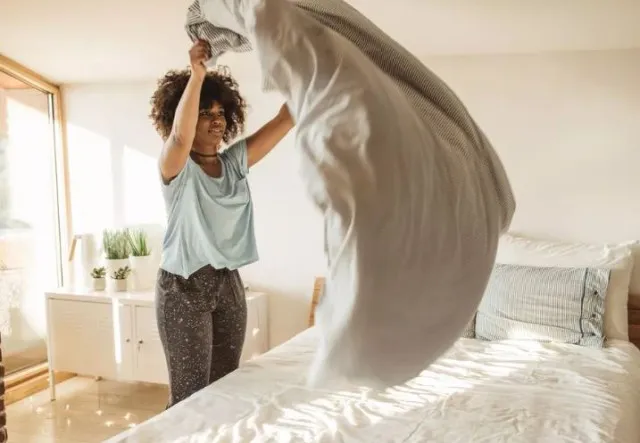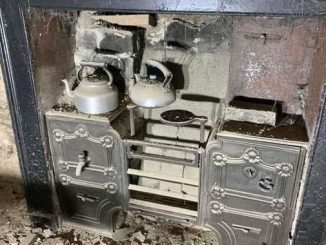Most of us were taught that making our bed each morning is a sign of tidiness and discipline. But a recent revelation from a top doctor has left many surprised, with his advice to not make the bed right after waking up. Dr. Myro Figura, a physician based in Los Angeles, shared this unexpected recommendation on social media, stating that leaving your bed unmade can actually improve indoor air quality and reduce allergy triggers. Curious as to why? Let’s dive into the “not lazy, but sanitary” reason behind this practice and how it can impact your health.
The Hidden World of Dust Mites in Your Bed

When we think of dust mites, we often picture microscopic, harmless particles. However, according to Dr. Figura, your bed might be a thriving habitat for these tiny creatures. Dust mites are invisible to the naked eye, but they love to dwell in mattresses, pillows, and sheets, where they feed on the skin cells we naturally shed while sleeping.
Consider this:
- A typical mattress can harbor over 10 million dust mites.
- After two years, an average pillow could consist of up to 10% dust mites and their waste.
Although dust mites don’t bite or spread diseases, they produce allergens that can trigger sneezing, congestion, itchy skin, and even worsen asthma or eczema. Making your bed immediately after waking may actually contribute to these health issues by creating the ideal environment for dust mites to thrive.
Why Making Your Bed Right Away Might Increase Dust Mites
Dr. Figura points out that dust mites survive and multiply in humid, warm environments. When you sleep, your body transfers moisture, sweat, and heat into the bedding, making it a cozy breeding ground for these pests. By making your bed right after you get up, you’re essentially trapping all that moisture in your sheets and mattress, allowing dust mites to flourish.
Locking in moisture after waking up provides dust mites with the exact conditions they need to thrive. Instead of a dry, inhospitable environment, a freshly made bed becomes a damp, warm paradise for these tiny pests.
The Benefits of Leaving Your Bed Unmade
So, what’s the solution? According to Dr. Figura, the key is to leave your bed unmade for at least an hour each morning. This simple step allows your bedding to dry out, reducing the moisture levels and making it harder for dust mites to survive. Here’s a breakdown of how this small habit change can make a big difference:
- Improved Air Quality: Dust mites release allergens that float into the air. By reducing their numbers, you’re cutting down on these airborne allergens.
- Better Allergy Control: If you suffer from allergies or asthma, letting your bed air out can lessen your exposure to dust mites and help manage symptoms.
- Healthier Environment: Dehydrated dust mites can’t multiply as quickly, leading to a cleaner and healthier bed over time.
Leaving your bed unmade, even just for an hour, can dry out the bedding and help lower dust mite populations naturally. This simple action might reduce allergy symptoms and improve your bedroom’s air quality.
How to Reduce Dust Mites in Your Bedding: Practical Tips

Aside from airing out your bed, Dr. Figura also recommends a few other habits to reduce dust mites in your sleeping area. Here’s how you can make your bed less inviting for these tiny allergens:
- Wash Sheets and Pillowcases Regularly: Wash your bedding at least once a week, or every two weeks if you don’t suffer from allergies. This helps to remove dust mites, skin cells, and any allergens accumulated on the fabric.
- Use Hot Water: Washing your sheets at a temperature over 60°C (140°F) can effectively kill dust mites. Be sure to check your bedding care labels first to avoid any damage.
- Vacuum Your Mattress: Use a vacuum with a HEPA filter to clean your mattress regularly. This will help to remove dust, mites, and other allergens lurking below the surface.
- Consider Allergen-Proof Covers: These covers encase your mattress and pillows, creating a barrier that keeps dust mites out. They’re easy to find online and can help you manage allergens.
- Opt for Lightweight Bedding: Heavier blankets and duvets can trap more moisture, making it harder for your bedding to dry out. Lightweight bedding allows for better airflow, reducing moisture buildup.
By following these steps, you’ll create a cleaner, healthier sleeping environment and make it much harder for dust mites to thrive in your bed.
Why Dr. Figura’s Video Went Viral: Mixed Reactions Online

Dr. Figura’s advice quickly went viral, sparking a lively debate on social media. Some viewers appreciated the tip and shared how they’d already been leaving their beds unmade for similar reasons. Others were amused or skeptical, jokingly commenting on how this habit aligns with their natural inclination to skip bed-making. A few viewers even suggested that bedding should come with health warnings if dust mites pose such a risk.
Comments included responses like:
- “Finally, a reason not to make my bed! It’s not laziness; it’s health-consciousness!”
- “Guess I’ve been helping my allergies all along without even knowing it!”
- “So… does this mean we should burn or replace our beds regularly?”
The video served as a reminder of how something as simple as making your bed can have unexpected effects on health. While the recommendation might seem unusual, there’s a science-backed benefit to airing out your bedding each morning.
Beyond Dust Mites: Other Health Benefits of Letting Your Bed Air Out

Leaving your bed unmade doesn’t only keep dust mites at bay. There are additional health and hygiene benefits to consider:
- Reduced Moisture in Your Room: Drying out your bedding can prevent mildew or mold from developing, which also thrives in damp environments.
- Less Musty Smell: A well-ventilated bed stays fresher and smells cleaner, as the air circulation helps dissipate odors from sweat and skin oils.
- Lower Humidity Levels: Allowing your bed to air out can help balance humidity levels in your room, which is especially beneficial in warm or humid climates.
Simply airing out your bed each day can lead to a healthier, fresher-feeling bedroom and an environment less conducive to allergens and other irritants.
Conclusion
While making your bed right after waking might seem like a responsible habit, Dr. Figura’s advice to leave it unmade could actually support a healthier home environment. Dust mites thrive in warm, moist conditions, and leaving your bed unmade gives your bedding time to dry out, reducing the moisture that dust mites need to survive. This small shift in your morning routine could help reduce allergens, improve indoor air quality, and even lessen allergy symptoms.
So, next time you feel like skipping the bed-making ritual, remember—it might not be laziness; it could be a smart choice for your health. Leaving your bed unmade each morning is a simple yet effective way to keep dust mites at bay, and your respiratory health intact.


